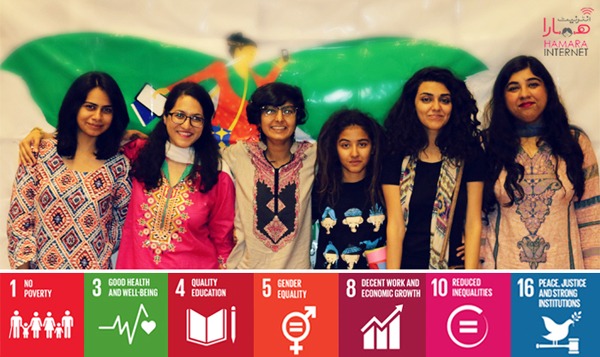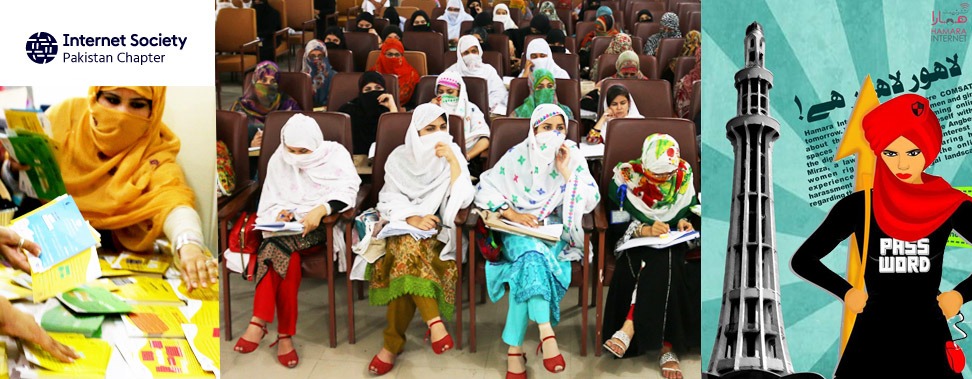Beyond the Net Journal: Pakistan Chapter #2 Episode
In the absence of any laws to tackle cyber harassment, Nighat Dad, digital rights advocate, created Hamara Internet (Our Internet), a pioneer project to raise the awareness of digital violence against women. The project, funded by Internet Society’s Beyond the Net, is now completed and opened a new chapter in the struggle for women’s rights in Pakistan.
Hamara Internet is all about WOMEN and their right to use the Internet free from harassment. Under the slogan “Internet Chalao, Patriarchy Dabao” (Use the Internet, Destroy Patriarchy), Hamara Internet provided women with skills to create safe online spaces and advocate for gender-inclusive Internet governance processes at a national level.
“The project has been successful in many ways.” says Nighad Dad “The main target of the campaign was to train about 300 students, but the program ended up training more than 460. Our efforts to involve women in large numbers were rewarded with an enthusiastic response. The more seminars we held the more we were asked by other colleges and universities to hold similar trainings in their institutes as well. The Internet Society mission had been introduced in every seminar we conducted by Mr. Faisal Shahzad, vice president of Pakistan Chapter. At the end of the campaign, the national conference we held in Islamabad attracted more than 100 young women from Lahore, Karachi, Quetta and Peshawar.”
Informative brochures about privacy and online safety have been created in both English and Urdu languages and distributed in the form of ten flip cards during seminars and conferences. The website hamarainternet.org was built to give legal and security advice, providing with the first digital harassment Crisis Center in Pakistan.
Hamara Internet success is providing key evidence that the Open Internet is an essential tool in facilitating the implementation of the Sustainable Development Goals, leveraging collaboration and partnerships needed to make them a reality. This is how the project is relevant for the following SDG’s goals:

1. No Poverty
In Pakistan poverty has a “woman’s face”. Women’s lives are affected by economic deprivation. They have been deprived of adequate education and forced to live in the tight bind of the patriarchal tradition. Hamara Internet is teaching women to take control of their lives and to catch online opportunities to reduce poverty.
3. Good health and well-being
One Pakistani woman dies every 37 minutes from complications during childbirth indicating poor maternal healthcare in the country. Domestic violence is still a main cause of complications related to pregnancy. Women safe access to the Internet allows to find information for a healthier life and to discuss about reproductive issues and domestic violence.
4. Quality education
We are talking about a country that has one of the lowest literacy rates in the world. Where women are forced to just bear children and stay within their houses. Where separate schools for girls are not available in several regions. In this scenario, offering access to appropriate technology allows all female students to get in contact with a world of opportunities, opening up access to education and training in a very cost-effective way. Women empowered through education will be able to improve their own living conditions, as well as the conditions of their society.
5. Gender equality
Pakistan has been ranked the second worst country in the world for gender equality (first is Yemen). The gender gap is dramatically widening and today is larger than 10 years ago. Hamara Internet is spreading awareness about the imbalances between women’s and men’s access and participation in ICTs and is fighting to ensure that women equally share the benefits arising from the global digital economy.
8. Decent work and economic growth
The main factors contributing to poor employment trends include low literacy rates, social taboos and regulations preventing the active participation of women in the economic growth. They are forced into low-paid jobs where their abilities remain unused. The project showed women that the possibilities to improve their lives going online are endless. Some are starting to use the Internet to run their own business, others are using it to manage entire projects or to create presentations for their colleges.
10. Reduced inequalities
There is a growing evidence of multiple inequalities in Pakistan: race, gender, geography and economy. The project is aiming to increase the capacity building of women and set a new paradigm of Internet governance in Pakistan by engaging women in political discussions.
16. Peace, justice and strong istitutions
The annual report by the independent Human Rights Commission of Pakistan recorded hundreds of rapes, kidnapping, acid attacks, amputations and burnings. Almost 800 women attempted suicide in 2016. Women are frequently too afraid to report the crimes or are forced to withdrawing complaints. The project team is working with institutions to integrate Hamara Internet workshops and training manuals in the educational programmes of schools and colleges to make the next generations more secure and well-informed.
This pioneer project had become a women’s movement contributing to make a better world, a world of more compassion and equality. The key to a better future of Pakistan lies in giving priority to the development of human capabilities for which the Internet role can make a difference.
Watch the video to hear from a cyber harassment victim
Stay tuned for the upcoming blog post and follow our stories on Twitter
Share this story
If you like this story, please share it with your friends. That would tremendously help in spreading the word and raising the visibility of this project. Help more people understand how the Internet can change lives.
We are interested in your project
We are looking for new ideas from people all over the world on how to make your community better using the Internet. Internet Society “Beyond the Net Funding Programme” funds projects up to $ 30.000 USD.
Find out more about the programme
Read more:

